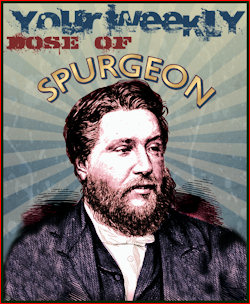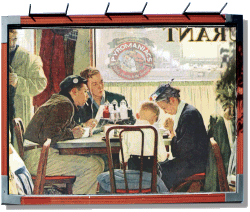
I’ll admit it: yesterday went badly.
Mostly, there was an abject refusal to obey the rules I asked all players to abide by, and while Dan valiantly tried to stem the tide, it all went completely downhill sometime around the place where I posted my reply to Adam O. Calvinists and their deniers were all to blame, so please everyone pause for a moment of repentance and shame.

OK. Now that you are all appropriately chastised, I have a couple-three observations about yesterday’s meta, and then a couple of words regarding why you should just stop pretending that modern-day objections to “Calvinism” are really “Arminian”, really not “pelagian”, and really do any good for you as you think about and proclaim the Gospel.
On the meta:
- Isn’t it somewhat bizarre that, given the opportunity to simply shine and show off how logical and biblically-cohesive their view is, the non-calvinists/anti-calvinists didn’t have much to say until the meta fell apart?
- And isn’t it completely telling that, as Dan pointed out, you can’t make the non-calvinist position make any sense in 500 words – you have to go long and hope that the reader isn’t paying close attention?
- Most importantly, isn’t it most telling that the non-calvinists really wind up being people who don’t receive Paul’s answer to the hypothetical questioner in Romans 9 with any kind of seriousness? You know: Romans 9 where God has apparently failed in His promise and man is sort of just a victim of God’s capricious choice to save or not.
But here’s the thing: almost none of these people are really “arminian”: they are post-Finney revivalists who are afraid that the Gospel in Calvinistic terms is too hard on God. It makes God too seriously-involved in the real world so that He might be (mis)construed as the author of evil. But the consequences of that concern have consequences these people do not have any regard for. For example:
- If God does not (in the Gen 50 sense) “intend” evil in any way, he certainly does not “superintend” the acts of the universe – so the future, while God may “know of it” in some way, is not in His control. The case the Bible makes plainly that God knows even if a single sparrow falls to the ground, and how many hairs are left on your head, and He knows the content of men’s hearts, and He does nothing without knowing the end from the beginning. No “arminian” makes any sense of this problem – which is a foundationally-biblical problem as it is actually the point of most of the Bible.
- Suffering has to make sense in this world. It is too pervasive a state for a “gospel” which is to be declared to every man to ignore – and the “arminian” who is trying to protect God from being sovereign over ever evil is stripping the Gospel of any credibility in a world where children starve, babies are murdered, old people suffer in pain and loneliness, nations suffer under despotic and vile men, and acts of nature dispossess people of life, liberty, and property every single minute of every day. The rosy world of the anti-calvinist simple, blithely, whistles past the pervasive nature of evil and pain in this world. If God is not in charge of it in some meaningful way, the universe He is allegedly running is running away from Him.
- The death of Christ cannot be explained if God did not intend it is some direct and specific way. It was an evil act: make no mistake. Peter says in Acts 2 it was an act of evil men. But He also then says it was God’s plan accomplished by God’s means. There is no meaningful explanation of the crucifixion of Christ unless it is to say that God intended it specifically and particularly.
Finney was himself a virulent anti-calvinist, so much so that it is hard not to call him a full-blown pelagian. His view that the faith should be about new methods and moral reform plainly spell out the problem: he doesn’t see man as essentially unable to be faithful to God – and frankly, that's Pelagius version 2.0. We sort of admit in humility that we are “sinners”, but that label doesn’t imply, for example, real enmity and rejection of God: it only means we make mistakes.
The Gospel comes, and Christ is sacrificed on a cross, not because you didn’t try hard enough. Christ’s work wasn’t made so you had an example of how to live a better life. The wall of enmity had to be torn down, and the only power strong enough to do it was perfect obedience and God’s authority. So I am sure you people will run the meta into the ground again today – because you didn’t really know this about yourselves, and it’s hard to hear. Listen: I’m on vacation. I’m not headed back this way today. You make sure you abide by the normal rules of this blog, and you can have the last word.
And go ahead and be in God’s house with God’s people on God’s day this week, and you could there repent of thinking God isn’t really great enough to be in authority over evil without being the author of evil. I forgive you – if you repent. God offers you the same deal – and it’s his opinion which should matter to you.
And I lack my normal sig file, so you'll have to suffer through ...
[Perhaps I can help — DJP]





 So no grandstanding. Answer the two key questions and then provide your thoughts on how these two critical issues relate to each other in brief form. If you’re not one of these people who have so many harsh words for the “calvinists”, I’m asking you to resist your urges to fly to the defense of the Gospel and Jesus and all that’s holy and let these people have their say. I promise you: if anyone takes up this challenge, they will do far more harm to their own confession than you ever could by arguing with them. In other words: no rebuttals in the meta. I’ll delete those as well.
So no grandstanding. Answer the two key questions and then provide your thoughts on how these two critical issues relate to each other in brief form. If you’re not one of these people who have so many harsh words for the “calvinists”, I’m asking you to resist your urges to fly to the defense of the Gospel and Jesus and all that’s holy and let these people have their say. I promise you: if anyone takes up this challenge, they will do far more harm to their own confession than you ever could by arguing with them. In other words: no rebuttals in the meta. I’ll delete those as well.

 ong-time readers of the blog
ong-time readers of the blog 
 n an unrelated note, I've noticed a lot of Twitter-Chatter this morning about John Piper at Alistair Begg's
n an unrelated note, I've noticed a lot of Twitter-Chatter this morning about John Piper at Alistair Begg's 
 The
The  ome will say, "If So-and-so, and So-and-so do not believe the gospel, then religion is a failure."
ome will say, "If So-and-so, and So-and-so do not believe the gospel, then religion is a failure."

 ere's an exchange of e-mail messages I had with an Arminian who wrote me to insist he had irrefutable arguments against the sovereignty of God in the salvation of sinners. It turned out he had a real gift for distilling Arminian presuppositions into neat sound-bites and supporting them with unusual proof-texts, but his points were hardly "irrefutable." (His messages are in the yellow boxes; mine are the bluish ones.)
ere's an exchange of e-mail messages I had with an Arminian who wrote me to insist he had irrefutable arguments against the sovereignty of God in the salvation of sinners. It turned out he had a real gift for distilling Arminian presuppositions into neat sound-bites and supporting them with unusual proof-texts, but his points were hardly "irrefutable." (His messages are in the yellow boxes; mine are the bluish ones.)











 hristian leaders in particular are charged with the task of defending the truth against those who would twist it (Acts 20:28-31). As politically incorrect as this might sound to postmodern ears, there are abroad and within the church "many who are insubordinate, empty talkers and deceivers . . .. They must be silenced" (Titus 1:10-11). Or, in the more picturesque imagery of King James parlance, "[Their] mouths must be stopped."
hristian leaders in particular are charged with the task of defending the truth against those who would twist it (Acts 20:28-31). As politically incorrect as this might sound to postmodern ears, there are abroad and within the church "many who are insubordinate, empty talkers and deceivers . . .. They must be silenced" (Titus 1:10-11). Or, in the more picturesque imagery of King James parlance, "[Their] mouths must be stopped." So the defense of the faith is no easy task. But it is an indispensable duty for faithful Christians. Again, Scripture is not the least bit vague or equivocal about that.
So the defense of the faith is no easy task. But it is an indispensable duty for faithful Christians. Again, Scripture is not the least bit vague or equivocal about that.

 hose who can look with delight or any degree of pleasure upon the sins of others are not holy. We know of some, who will not themselves perpetrate an unseemly jest, yet, if another does so, and there is a laugh excited upon some not over-decent remark, they laugh, and thus give sanction to the impropriety. If there is a low song sung in their hearing, which others applaud, though they cannot quite go the length of joining in the plaudits, still they secretly enjoy it; they betray a sort of gratification that they cannot disguise; they confess to a gusto that admires the wit while it cannot endorse the sentiment.
hose who can look with delight or any degree of pleasure upon the sins of others are not holy. We know of some, who will not themselves perpetrate an unseemly jest, yet, if another does so, and there is a laugh excited upon some not over-decent remark, they laugh, and thus give sanction to the impropriety. If there is a low song sung in their hearing, which others applaud, though they cannot quite go the length of joining in the plaudits, still they secretly enjoy it; they betray a sort of gratification that they cannot disguise; they confess to a gusto that admires the wit while it cannot endorse the sentiment.

 don't even remember doing the following interview, but Will Moneymaker dug it up somewhere and added it to the GraceLife Pulpit's collection of my sermons (and miscellaneous other recordings):
don't even remember doing the following interview, but Will Moneymaker dug it up somewhere and added it to the GraceLife Pulpit's collection of my sermons (and miscellaneous other recordings):

 on't you think effeminate evangelicalism is yesterday's problem?" an e-mail correspondent asked. "Why write about that now? Over the past 15 years there have been some very influential men's
on't you think effeminate evangelicalism is yesterday's problem?" an e-mail correspondent asked. "Why write about that now? Over the past 15 years there have been some very influential men's  movements like Promise Keepers; fantastic books for men like Wild at Heart; and other books honestly talking about this subject. Cage fighting is practically the favorite sport for Christian guys in my generation; beer and cigars are the main attractions at some men's groups in forward-thinking churches. You're the one rebuking young men for using virile language in church. What right do you have to complain that the church is too effeminate?"
movements like Promise Keepers; fantastic books for men like Wild at Heart; and other books honestly talking about this subject. Cage fighting is practically the favorite sport for Christian guys in my generation; beer and cigars are the main attractions at some men's groups in forward-thinking churches. You're the one rebuking young men for using virile language in church. What right do you have to complain that the church is too effeminate?" One of the recurring figures of masculinity that John Eldredge keeps bringing up in Wild at Heart is Maximus from the movie Gladiator. A fantasy character! The subtitle of the book is Discovering the Secret of a Man's Soul. But here is the secret of a man's soul according to John Eldredge: "Deep in his heart, every man longs for a battle to fight, an adventure to live, and a beauty to rescue."
One of the recurring figures of masculinity that John Eldredge keeps bringing up in Wild at Heart is Maximus from the movie Gladiator. A fantasy character! The subtitle of the book is Discovering the Secret of a Man's Soul. But here is the secret of a man's soul according to John Eldredge: "Deep in his heart, every man longs for a battle to fight, an adventure to live, and a beauty to rescue." Incidentally, it needs to be said that the crisis in the church is not primarily the fault of women who have shifted the focus of the church away from men. It's the fault of men who are too timid, too lazy, too fainthearted, too self-absorbed, too immature, too emotionally dysfunctional, too crude, too in love with fleshly values, or whatever. They have turned the church over to women.
Incidentally, it needs to be said that the crisis in the church is not primarily the fault of women who have shifted the focus of the church away from men. It's the fault of men who are too timid, too lazy, too fainthearted, too self-absorbed, too immature, too emotionally dysfunctional, too crude, too in love with fleshly values, or whatever. They have turned the church over to women.








